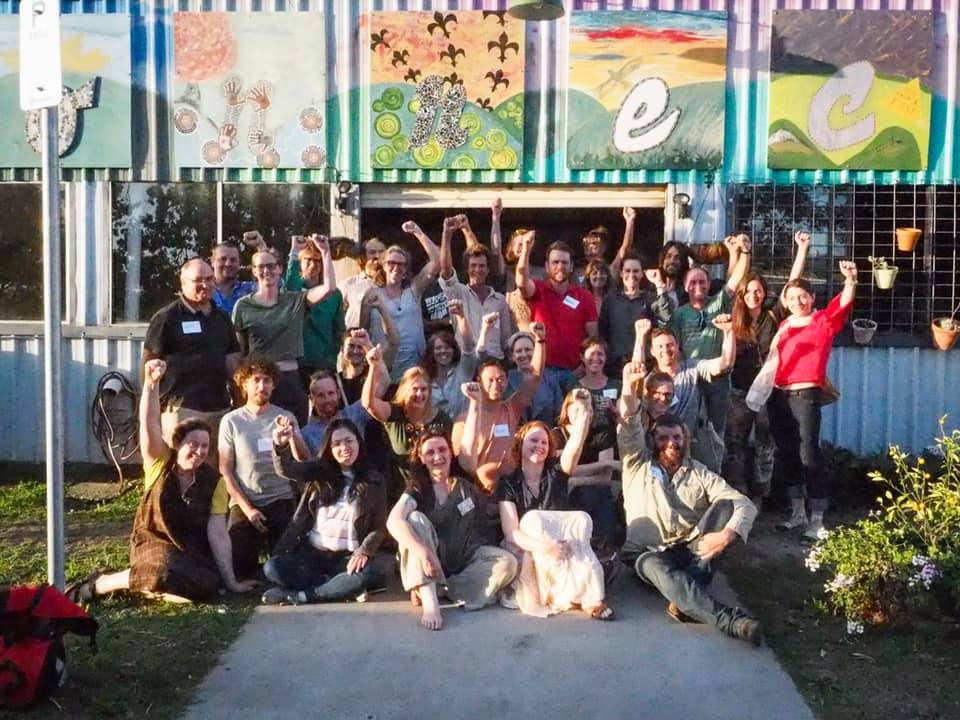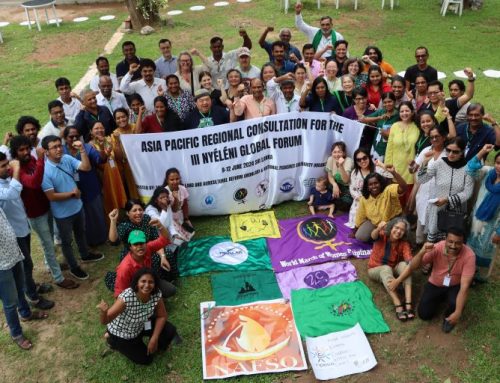What a delicious year of growing and eating and winning and celebrating it’s been for AFSA! And yet while the food sovereignty movement has had many successes, I’d like to acknowledge the very real struggles farmers across Australia, especially in the east, are facing in the worst climate-change-affected areas. The past year has seen the loss of countless farms as the rains simply haven’t come, dams and water allocations have dried up, and grain stores run out. Australian dairy farms are in crisis, as are pig and poultry farms reliant on grain inputs that have had astronomical price rises, and horticulture farms reliant on rain that hasn’t fallen or water stolen further upstream by big irrigators with the support of corrupt government policies. AFSA is committed to supporting farmers in climate-proofing their farms and business models with agroecological and degrowth practices to ensure a future of radical abundance is possible for all.
This time last year we saw the introduction of simplified guidelines for pastured pig and poultry farms in Victoria. It was a hard-won result after three years of working closely with the Victorian government to achieve acknowledgement of the low risk small-scale pastured pig and poultry farms pose to community amenity and ecosystems.
Meanwhile, we were also working hard on AFSA’s second book Farming Democracy: Radically transforming the food system from the ground up – launched in March 2019. Farming Democracy is the story of eight diverse and fascinating small-scale regenerative farmers from around Australia. In telling their stories each farm identifies and illustrates many of the issues they have faced in their quest to establish a fair, democratic, sustainable and resilient food system on their farm.
The farms in the book are as diverse as the food they produce, some with full or partial control of their supply chains, with varying levels of diversity and integration in their models, and at different places in their thinking about the role of growth in their businesses, all thoughtful in their approaches. They opened their hearts, their farms, and even their books to show what it costs (and earns) to grow and distribute food in ethical and ecologically-sound ways.
We launched the book at Farm Day Out at Jonai Farms in the central highlands of Victoria, a region that is an epicentre of the small-scale regenerative and agroecological farming movement. While the event itself was not a successful fundraiser for AFSA as intended, it was a joyful day of like-minded people working towards a food sovereign future fuelled by good tunes, great vibes, and excellent food. Important lessons about the way we try to fundraise for the food sovereignty movement were learned.
In April, we welcomed the visit by the UN’s High Level Panel of Experts to Canberra, where they explained their newest report on agroecology and ‘other innovations’ for sustainable agriculture, and noted with dismay the stark difference in the CSIRO’s understanding of and demonstrable lack of support for agroecology, a position we’ve witnessed regularly in the Australian government’s participation in international meetings of various governing bodies of the UN.
AFSA happily accepted an invitation to become a member of the newly constituted Regenerative Agriculture Alliance established at Southern Cross University (SCU). Together with new and old comrades from across all scales of the regenerative farming movement, we’re working to influence policy at all levels to support the management of healthy soils to repair Australia’s degraded landscapes and assure a prosperous and long future for Australian agriculture.
Many AFSA members and Committee members attended the fifth annual Deep Winter Agrarian gathering at Willunga in South Australia, renewing and striking new friendships and camaraderie with the movement of small-scale regenerative and agroecological farmers and our allies. We issued a declaration calling for recognition of the long experience and deep traditional knowledge of the Traditional Owners’ food production and care for land, increased attention to our critically endangered soils using holistic management and regenerative practices in agriculture, and for increased farmer and community control of the means of production – supply chain infrastructure such as abattoirs, boning rooms, grain mills, and the like.
AFSA are part of a global movement opposing the introduction of GMOs into the food chain without adequate regulation and scant consideration for human health. In solidarity with other organisations and individuals working to stop the de-regulation of GMO in Australia and globally, we have written to politicians and attended meetings advocating for safe regulation and labelling of GMO. New moves to de-regulate ‘new breeding techniques’ put all of us at risk of eating untested, unlabelled genetically modified (GM) foods – including animals. Powerful scientific evidence shows that new GM techniques such as CRISPR pose risks that require expert assessment and management. It’s vital that gene edited organisms are assessed for safety before being released into our environment and supermarkets.
While we reluctantly farewelled the exuberant Sarah de Wit, our excellent inaugural AFSA Legal Defence Fund paralegal, it was with great pleasure that we hired Airlie Morris, a lawyer with 20 years’ experience, to build on Sarah’s foundational work supporting and advocating for small-scale farmers, food producers, and eaters in Australia.
It was another busy year writing government submissions advocating for small-scale farmers and everyone’s right to nutritious and delicious food. Amongst a number of other submissions around the regulation of veterinary and agri-chemicals, protection of valuable agricultural land around Melbourne, animal welfare standards, and the impact of animal rights activists on livestock farmers, we put a strong case against FSANZ’s proposal to require a licence to sell lettuce, which we cautiously believe looks unlikely to proceed.
Our international work (funded by the Food & Agriculture Organisation (FAO) of the UN) has remained strong, with participation at the UN Commission on Genetic Resources for Food and Agriculture (CGRFA) as sub-regional members of the International Planning Committee for Food Sovereignty (IPC), where the first Report on the State of the World’s Biodiversity for Food & Agriculture was launched. The world is losing biodiversity at an alarming rate, and the UN is under no illusions that industrial agriculture is playing a significant part in the problem, while agroecology can play a major part in the solutions. We were honoured to be part of seed sovereignty meetings in northern Italy and learn some of the ways communities of farmers are wresting back control of seeds from the handful of multinational corporations who control the global seed supply.
Two of our farmer members of the National Committee attended the annual regional conference of La Via Campesina in Japan, and another the regional women’s conference in Thailand, working with our comrades from across South East and East Asia to shine the light on the negative impacts of multinational corporations controlling the food system and promoting the rights of peasants and Indigenous Peoples to collectively determine their own food and agriculture systems.
AFSA Secretary Ruth Gaha-Morris was selected for the sub-regional role on the Coordinating Committee of the Civil Society Mechanism (CSM), which articulates to the UN World Committee for Food Security (CFS), and joins us at this year’s Food Sovereignty Convergence directly from meetings in Rome.
Scanning the horizon, AFSA have our sights set on legalising sales of raw milk from the farm gate as one means of saving Australia’s dying dairy industry while giving people the choice to consume unprocessed foods from a safely regulated industry. We’re also closely monitoring the rise of false solutions to the problems of industrial agriculture such as the corporate-controlled rise of mass-produced vegetable-based protein patties and lab meat. We reject all ‘solutions’ that simply maintain corporate control of the food system in an undemocratic capitalist economy.
I’d like to thank the 2019 National Committee and staff for your work and commitment to the food sovereignty movement locally and globally, as well as your camaraderie and many shared feasts over the year. To those who are leaving us to focus on fertile grounds at home and in your local communities – Anna Treasure, Fraser Bayley, Kat Munksgaard, and Jess Brugmans – a special thank you and fare thee well!
We fight for what we eat, we eat what we fight for!
Viva la revolución!
Tammi Jonas, President
22 October 2019




